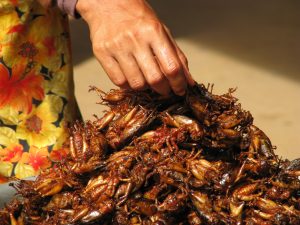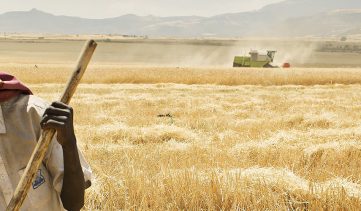The following post by Sivan Yosef was originally published on the Nourishing Millions blog. Nourishing Millions, a collection of evidence-based case studies of nutrition successes, contributes to Compact2025’s global Knowledge and Innovation Hub.
Can we really rid the world of hunger and malnutrition in under a decade? The Nourishing Millions podcast series, undertaken in partnership with the University of Michigan School of Public Health, seeks to answer this very question. The series has 11 short episodes, one released each week, that feature the latest groundbreaking thinking about nutrition from top policymakers, researchers, and practitioners. Together, they tell the story of how small and large movements—and everyday people—can help us achieve a food- and nutrition-secure world. Listen to our one-minute trailer for more.
In our first episode, we interview Dr. Jacob Anankware, an entomologist from Ghana. Entomology is the scientific study of insects, and entomophagy is the practice of eating them. According to Dr. Anankware, insects have the potential to solve malnutrition, especially in developing countries. They are extremely abundant, highly nutritious, and environmentally sustainable, and may prove to be a formidable opponent to conventional meat.
“ [Meats] need substantial amounts of vegetation, land, and emit relatively high amounts of greenhouse gases. The majority of insects on the other hand do not do that,” says Anankware.
Believe it or not, entomophagy is nothing new. According to Dr. Anankware, there are about 2 billion people worldwide consuming insects. In the interview, he speaks about how his current project, the raising of the African palm weevil larvae is nourishing the people of rural Ghana.
“I’m hopeful that I’ll be able to put edible insects on every dining table around the world in the next 10-15 years,” says Anankware.
Listen to the podcast (or on iTunes here) to learn more about the world of entomophagy.



